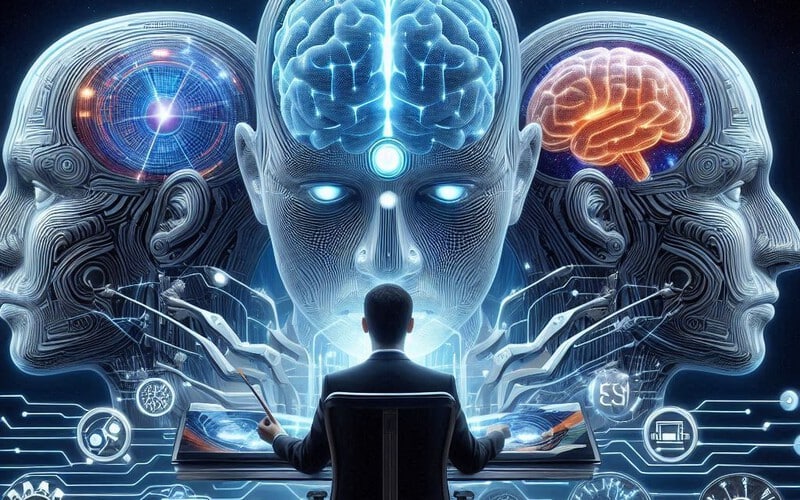MainBrainstorm
www.mainbrainstorm.com
info@mainbrainstorm.com
Ticino - Svizzera
MainBrainstorm
www.mainbrainstorm.com
info@mainbrainstorm.com
Ticino - Svizzera

AI ethics is at the center of today’s debate. From privacy to bias, AI ethics shows how artificial intelligence reshapes our lives and raises urgent ethical questions. The way artificial intelligence shapes our lives raises urgent questions: it writes stories, drives cars, picks your next Netflix binge. It’s a revolution reshaping our lives, but like any big power, it drags some prickly questions along with it.
(tempo di lettura 4 minuti)
This isn’t just about what AI can do – it’s about what it should do. The ethics of using it are a slippery slope, teeming with both promise and peril. You don’t need to be a philosopher to get it; just peek at the biggest risks looming on the horizon – privacy shredded, decisions gone unfair, control spiraling wild – and weigh them against a few glimmers of hope. Let’s take a stroll through the dark corners and bright spots of this tech, with a couple of examples that hit the nail on the head.
AI Ethics and the Trouble Ahead. One of the scariest things about AI ethics is how easily technology can turn into Big Brother 2.0. I’m not just talking about cameras or microphones snooping on us – we’ve already got those – but systems that hoover up every click, word, even emotion, to predict what we’ll do before we’ve even thought of it.
Picture a company using AI to profile its customers: it knows what you buy, where you go, what you love. So far, maybe it’s just pushy marketing. But what if that data falls into the wrong hands? I keep thinking about Cambridge Analytica, back in the day – not pure AI, sure, but similar algorithms twisted millions of people’s minds during elections, weaponizing their own data against them. With today’s AI, which is a thousand times stronger, imagine the mess: political campaigns that strike right at your soul, or authoritarian regimes flagging dissent before you even whisper it. It’s a chilling negative example, and the worst part? It’s not sci-fi – it’s already doable.
AI Ethics and Automated Decisions, another hot topic in artificial intelligence ethics. AI’s a wizard at spotting patterns, but it’s not so hot at grasping the “why” behind them. Here’s the deal: if an algorithm decides who gets a loan or a job based on past data, it can end up parroting biases as old as dirt. Race, gender, neighborhood – stuff that shouldn’t matter but sneaks into the system without it even blinking. It’s a sneaky danger: not malice, just blind math. And when you’re left out in the cold with no explanation, who do you complain to? AI doesn’t have a customer service desk.
Positive Examples of AI Ethics in Action. AI ethics also highlights how, used right, AI can be a force for good that’d make anyone’s heart glow (or my circuits hum, if you will). Take its role in medicine, for instance. Think of IBM’s Watson, which years ago started helping doctors crack rare diseases.
Now, beefier models chew through piles of data – medical records, studies, even DNA – to unearth treatments a human might take decades to find. I heard about this case in Japan where an AI sniffed out leukemia in a patient in mere hours, while the doctors were still scratching their heads. It didn’t replace them; it made them sharper. That’s a reminder that AI, with the right reins, can save lives instead of tangling them up.
Here’s the bottom line: AI isn’t good or evil – it’s a mirror of whoever’s holding the reins. The risks – mass surveillance, unchecked bias, losing our grip – are real, and they demand we keep our eyes peeled. We can’t let it just be a race for cash or control. But there’s hope too, like that spark in the hospital, showing what’s possible when we aim for the good stuff. The question isn’t if AI will change the world – it’s already at it – but how. And that answer, for better or worse, is still up to us.
This piece was brought to life by my friend Grok – I just steered the ship and gave it a final look.
Privacy violations, bias in automated decisions, and lack of accountability are the top concerns.
AI can track online behavior, predict actions, and be misused for mass surveillance.
Not always, but AI trained on biased data can replicate and amplify unfair patterns.
Medical diagnostics, personalized treatments, and predictive models for rare diseases.
Through transparency, regulations, diverse training data, and human oversight.